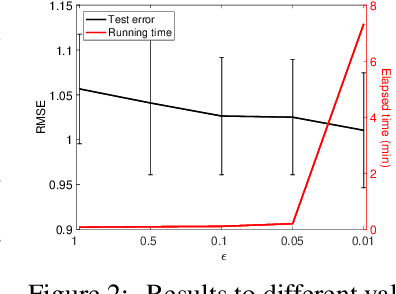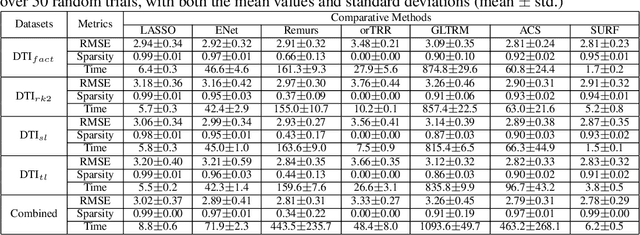Wanwan Xu
Statistically Guided Divide-and-Conquer for Sparse Factorization of Large Matrix
Mar 17, 2020



Abstract:The sparse factorization of a large matrix is fundamental in modern statistical learning. In particular, the sparse singular value decomposition and its variants have been utilized in multivariate regression, factor analysis, biclustering, vector time series modeling, among others. The appeal of this factorization is owing to its power in discovering a highly-interpretable latent association network, either between samples and variables or between responses and predictors. However, many existing methods are either ad hoc without a general performance guarantee, or are computationally intensive, rendering them unsuitable for large-scale studies. We formulate the statistical problem as a sparse factor regression and tackle it with a divide-and-conquer approach. In the first stage of division, we consider both sequential and parallel approaches for simplifying the task into a set of co-sparse unit-rank estimation (CURE) problems, and establish the statistical underpinnings of these commonly-adopted and yet poorly understood deflation methods. In the second stage of division, we innovate a contended stagewise learning technique, consisting of a sequence of simple incremental updates, to efficiently trace out the whole solution paths of CURE. Our algorithm has a much lower computational complexity than alternating convex search, and the choice of the step size enables a flexible and principled tradeoff between statistical accuracy and computational efficiency. Our work is among the first to enable stagewise learning for non-convex problems, and the idea can be applicable in many multi-convex problems. Extensive simulation studies and an application in genetics demonstrate the effectiveness and scalability of our approach.
Boosted Sparse and Low-Rank Tensor Regression
Nov 03, 2018



Abstract:We propose a sparse and low-rank tensor regression model to relate a univariate outcome to a feature tensor, in which each unit-rank tensor from the CP decomposition of the coefficient tensor is assumed to be sparse. This structure is both parsimonious and highly interpretable, as it implies that the outcome is related to the features through a few distinct pathways, each of which may only involve subsets of feature dimensions. We take a divide-and-conquer strategy to simplify the task into a set of sparse unit-rank tensor regression problems. To make the computation efficient and scalable, for the unit-rank tensor regression, we propose a stagewise estimation procedure to efficiently trace out its entire solution path. We show that as the step size goes to zero, the stagewise solution paths converge exactly to those of the corresponding regularized regression. The superior performance of our approach is demonstrated on various real-world and synthetic examples.
 Add to Chrome
Add to Chrome Add to Firefox
Add to Firefox Add to Edge
Add to Edge